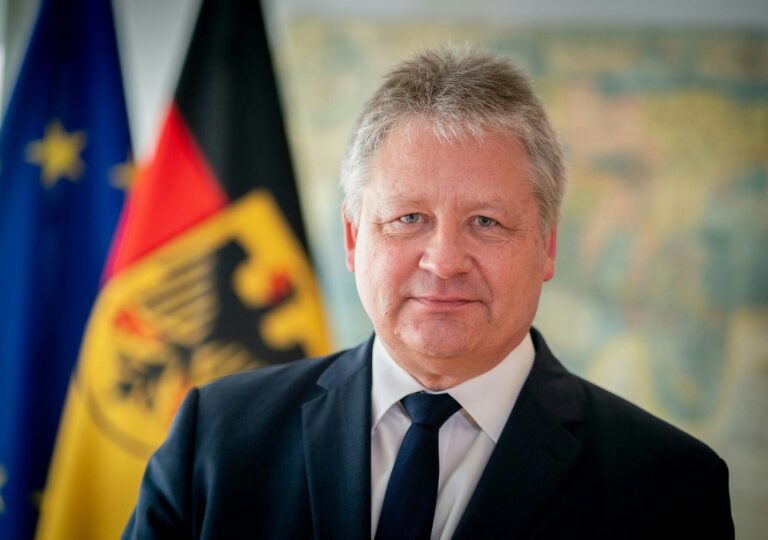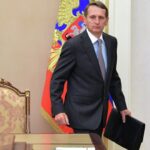For Germany’s Military Counterintelligence Service (BAMAD), the current situation would entail various unclear legal issues. This concerns, among other things, the German brigade stationed in Lithuania.
THE 5TH SYMPOSIUM ON the Law of Intelligence Services (Symposium zum Recht der Nachrichtendienste) took place in Berlin, Germany, on March 21-22. In view of the public criticism that German intelligence agencies have faced in recent times, it was probably a relief for their officials to be able to talk more-or-less among themselves for once.
It was organized by the Federal Ministry of the Interior and the Federal Chancellery Office. This year’s topic was: “Intelligence Agencies and Armed Conflicts”. It included the tried and tested mix of academics —predominantly legal scholars—, practitioners and heads of various government authorities. The majority of the external experts discussed the complicated and, in Germany, arduous parliamentary procedures that would arise in the event of a war.
The director of the BND, Bruno Kahl, mentioned, that he had been trained in interrogation and had learnt Russian. However, Kahl was less relaxed when talking about new legislation, which would make the work of the intelligence services more arduous. In his opinion, certain groups in society are pursuing alternative legislation. Individuals had been found to have taken legal action in the interests of these groups, he said.
Moreover, according to Kahl’s self-confident view, the BND would continue to receive information from its international partners because they were in receipt of information from the BND in advance. It was a form of recognition toward the BND, he said. Critics, however, tend to believe that the German intelligence agencies are too self-limiting in their ability to gather much information on attacks or enemy espionage, due to self-imposed-restrictions —a view that was recently voiced by the former director of the BND, Gerhard Schindler.
The representative of a state control commission ventured a look into the future. According to him, there have been no significant changes for the German intelligence agencies in their cooperation with the United States under the Donald Trump administration. This could also be assumed in the event of Trump’s re-election.
A month later, on April 22, another symposium) was held in Berlin, this time organized by the BfV. It was titled, “Effects of International Crises and Events on the Security Situation in Germany”. While the symposium in March opened with a keynote speech by an academic, the President of the BfV, Thomas Haldenwang, gave the opening speech this time. The content of the presentations, and the composition of the participants, were highly reminiscent of the symposium held in March. However, the developments of recent days show the necessity for the German security authorities to deal even more with scientific and pragmatic questions that venture beyond the political discussions. In that respect, these events are a step in the right direction.
Nevertheless, prominent critics —for example in light of current espionage incidents or Islamist demonstrations in Germany— are calling for more competences and fewer restrictions for the German secret services. Particularly in view of current cases such as in Hamburg, where demonstrators called for the establishment of a caliphate in Germany, the mainstream media are increasingly raising concerns about the excessive politicization of intelligence work in the country.
In view of the controls increasingly being placed on German intelligence agencies by various bodies and authorities —which were also represented at the symposium— a certain discrepancy became apparent repeatedly in the presentations: How can the German intelligence agencies react adequately and quickly to hybrid threats when these types of threat do not concern themselves with administrative-legal subtleties and parliamentary procedures? Although the concept of hybrid threats was generally taken for granted and therefore hardly discussed in terms of content, those present agreed at a minimum that disinformation is part of it. All the more worrying was the statement by one speaker who explained that there was no official definition of disinformation within the German security authorities’ legal codes.
In the discussion, the panel moderated by Center for Intelligence Service Training and Further Education (ZNAF), the common training and study location of the Federal Intelligence Service (BND) and the Federal Office for the Protection of the Constitution (BfV), clearly stood out and underscored that this relatively new institution has made a name for itself in the academic intelligence landscape since its establishment in 2019.
However, the symposium also showed that the German security bureaucracy tends to reach its limits when it comes to current developments in the unconventional domain. This was demonstrated, for example, by a speaker’s demand that hybrid risks ought to be assigned to a “state area of responsibility”. The problem, however, lies precisely in the statelessness of hybrid risks. The existing regulations are also proving to be counterproductive, in view of the challenges: Due to the strict separation in the legal domain, personal data cannot simply be passed on from the BND to the Federal Police, for example.
According to the BND, the agency is well-positioned to counter threats in the virtual domain —note that a third of all attacks seen in this area involve ransomware. Attacks on German critical infrastructure have increased significantly, especially since the beginning of the war in Ukraine. The authority’s Computer Emergency Response Teams (CERTs) would keep an eye on this area. The BND would be particularly well placed to respond to international threats as, according to one speaker, it cooperates with around 500 foreign intelligence agencies.
The latest developments confirm the need, not only for sufficient personnel and state-of-the-art technology, but also for vigilance and alertness in general: the German government recently announced that it holds the Russian secret services responsible for a series of cyber-attacks on the party of Chancellor Olaf Scholz.

More on this story: Moscow used mock eavesdropping to launch campaign targeting Olaf Scholz
The so-called Taurus affair, which occurred just a few weeks ago, has also shown that there is much need for optimization within the German security bureaucracy in the area of cyber awareness.In the concluding discussion of the symposium, a number of topics were explored in more depth, with the heads of the three intelligence agencies also sitting on the podium this time. An invited journalist reported that the head of the British Secret Intelligence Service (MI6), Richard Moore, whom she had interviewed, had stated that he did not understand the eternal German debate about the nation’s intelligence agencies. There was too much regulation and Moore doubted whether the Germans even knew where the enemy and their partners were.
Dr. Stephan Blancke, a political scientist and analyst of international state and non-state intelligence. He has researched Cyber Warfare in Geneva and worked in an Intelligence & Analysis unit at the UK Home Office. He also worked at the Centre for Science & Security Studies (CSSS) at King’s College London in the field of proliferation and illicit procurement networks. Has been an Associate Fellow at the Royal United Services Institute (RUSI) in LondonSince November 2022. Writes for Jane’s Intelligence Review, Intelligence Online, NK News and others




